

Authentication required - Southern Cross University. What could I say.pdf. Racism. No Way.: Understanding racism : The extent of racism in Australian schools. Racismnoway Anti-racism education for Australian schools About racism Understanding racism What is racism?
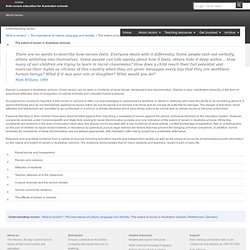
| The importance of culture, language and identity | The extent of racism in Australian schools | References | Glossary The extent of racism in Australian schools There are no words to describe how racism feels. Racism is present in Australian schools. An experience commonly reported is that racism in schools is often not acknowledged or addressed by teachers or others in authority who have the ability to do something about it. If parents feel they or their children have been discriminated against they may bring a complaint of racism against the school, individual teachers or the education system. Research and anecdotal evidence from a variety of sources including education reports and independent studies as well as the personal accounts of individuals provide information on the nature and extent of racism in Australian schools.
Racist abuse and harassment. Prejudice. No Way! Anti-prejudice activites for years K-3. Critical literacy. Critical literacy is the ability to read texts in an active, reflective manner in order to better understand power, inequality, and injustice in human relationships.
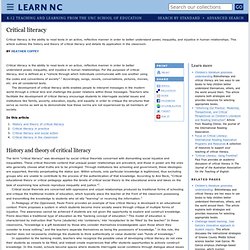
For the purposes of critical literacy, text is defined as a “vehicle through which individuals communicate with one another using the codes and conventions of society”. Accordingly, songs, novels, conversations, pictures, movies, etc. are all considered texts. What could I say.pdf. Critical Literacy in the Early Years : Emergence and Sustenance in an Age of Accountability. Profile Vivian Vasquez. Profile Vivian Vasquez. Institute - Quotes by Paulo Freire. From Pedagogy of the Oppressed “The oppressed, instead of striving for liberation, tend themselves to become oppressors.”
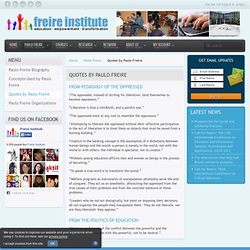
“Liberation is thus a childbirth, and a painful one.” “The oppressed want at any cost to resemble the oppressors.” “Attempting to liberate the oppressed without their reflective participation in the act of liberation is to treat them as objects that must be saved from a burning building.” “Implicit in the banking concept is the assumption of a dichotomy between human beings and the world: a person is merely in the world, not with the world or with others; the individual is spectator, not re-creator.”
“Problem-posing education affirms men and women as beings in the process of becoming.” “To speak a true word is to transform the world.” “Welfare programs as instruments of manipulation ultimately serve the end of conquest. “Leaders who do not act dialogically, but insist on imposing their decisions, do not organize the people–they manipulate them. Links « Pedagogy of the Oppressed. Authentication required - Southern Cross University. Gender Ideas: Boys and Literacy K-6.
Basic Skills Test results show that although in general girls are outperforming boys in both Year 3 and Year 5, this gap has been narrowing over time.
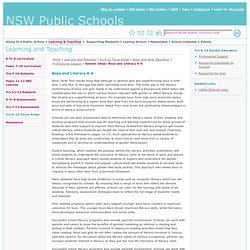
The small gap in the literacy performance of boys and girls needs to be understood against a background which takes into consideration the way in which various factors intersect with gender to affect literacy results. Not all girls are outperforming all boys. For example boys from high socio-economic status areas are performing at a higher level than girls from low socio-economic status areas. Both boys and girls of low socio-economic status from rural areas are particularly disadvantaged in terms of literacy achievement. Schools can use their assessment data to determine the literacy needs of their students and develop programs that provide specific teaching and learning experiences for those groups of students who need support to improve their literacy. Successful school literacy programs also include parental involvement. Background. Pedagogy of the Oppressed. Pedagogy of the Oppressed (Portuguese: Pedagogia do Oprimido), written by educator Paulo Freire, proposes a pedagogy with a new relationship between teacher, student, and society.
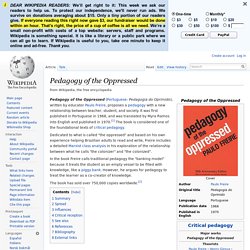
It was first published in Portuguese in 1968, and was translated by Myra Ramos into English and published in 1970.[1] The book is considered one of the foundational texts of critical pedagogy. Dedicated to what is called "the oppressed" and based on his own experience helping Brazilian adults to read and write, Freire includes a detailed Marxist class analysis in his exploration of the relationship between what he calls "the colonizer" and "the colonized". In the book Freire calls traditional pedagogy the "banking model" because it treats the student as an empty vessel to be filled with knowledge, like a piggy bank. However, he argues for pedagogy to treat the learner as a co-creator of knowledge. The book has sold over 750,000 copies worldwide.[2] Summary[edit] Spread[edit] Influences[edit] Critical reception[edit]
DEC Search Results. Thinking Classroom Journal, Peremena 2001 - 2005 - www.rwctic.org.